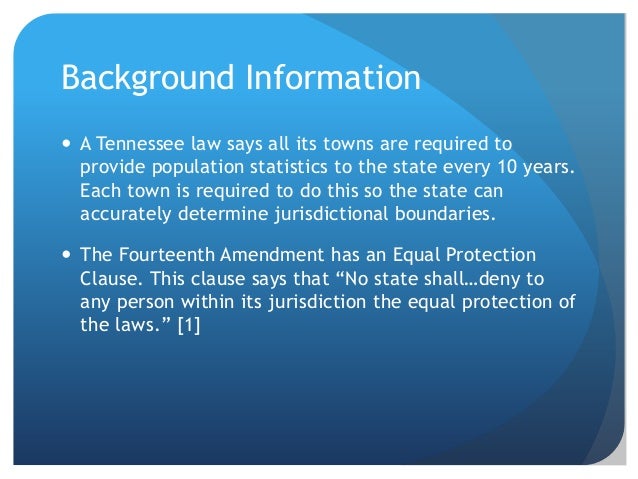In 1870 Tennessee revised its constitution to comply with new federal provisions introduced after the American Civil War. He sued the state officials responsible for supervising elections.
 Baker Vs Carr Explained Youtube
Baker Vs Carr Explained Youtube
The state claimed redistricting was a political question and non-justiciable.

Baker vs carr summary. The defendants unsuccessfully argued that reapportionment of. Carr This was the state of the law when Baker v. Baker petitioned to the Supreme Court of the United States.
Cause the exact same summary applies to Baker v. Carr a Supreme Court case concerning equality in voting districts. 2 protection of the laws under the 14th Amendment because their votes were devalued He argued that his vote and those of voters in similar situations would not count the same as those of voters residing in less populated rural areas.
Carr 1962 A Summary. A Tennessee resident brought suit against the Secretary of State claiming that the failure to redraw the legislative. Charles Baker brought suit in 1961 against Joe Carr Tennessees Secretary of State as a representative of the state of Tennessee.
Decided in 1962 the ruling established the standard of one person one vote and opened the door for the Court to rule on districting cases. Carr is a case concerning the effects of old unchanged election statutes. Carr2 There the Warren Court perceived a crisis that defied a political solu tion.
Carr2l was decided by the Supreme Court. Supreme Court case that forced the Tennessee legislature to reapportion itself on the basis of population. Traditionally particularly in the South the populations of rural areas had been overrepresented in legislatures in proportion to those of urban and suburban areas.
Carr 1962 was a landmark case concerning re-apportionment and redistricting. The complaint Baker alleged that by means of a 1901 statute of Tennessee apportioning the members of the General Assembly among the states 95 counties these plaintiffs and others similarly situated are denied the equal protection of the laws accorded them by the Fourteenth Amendment to the Constitution of the United States by. - The number of Senators.
And shall not exceed seventy-five until the population of the State shall be one million and a half and shall never exceed ninety-nine. He claimed that the districts used to determine. In a 6 2 decision the Supreme Court ruled that the state of Tennessee was in violation of Constitutional law.
Charles Baker a voter brought suit against the state Joe Carr was a state official in charge of elections in federal district court claiming that the dilution of his vote as a result of the states failure to. Explore Course Heros library of literature materials including documents and QA pairs. Complainants were urban voters in Tennessee who alleged a denial of equal protection and due process through debasement of their voting rights Tennessee not having reapportioned since 1901 in violation of the state constitution.
Carr case decided in 1962 by the US. The United States Supreme Court ruled that federal courts could hear and rule on cases in which plaintiffs allege that re-apportionment plans violate the Equal Protection Clause of the Fourteenth Amendment. This study guide for United States Supreme Courts Baker v.
Case Summary of Baker vCarr. They asked that the 1901 reappor-. Carr 1962 page 3 counties or districts according to the number of qualified voters in each.
Provided that any county having two-thirds of the ratio shall be entitled to one member. This constitution required redistricting or the reapportionment of state representatives each decade to reflect changes in population. A deep dive into Baker v.
186 was a Supreme Court of the United States case which decided that reapportionment issues attempts to change the way voting districts are delineated present justiciable questions thus enabling federal courts to intervene in and to decide reapportionment cases. Carr offers summary and analysis on themes symbols and other literary devices found in the text. Baker sought a court injunction to postpone elections until the State had fulfilled its duty to reapportion its legislative districts which it had not done since 1901 over 60 years.
Plaintiff and Shelby County resident Charles Baker alleged that he was denied equal protection under the Fourteenth Amendment and sued Joe Carr Tennessees Secretary of State. Carr 1962 2018 Street Law Inc. Tennessee and many other states had always apportioned legislative districts to reflect various interests eg geographic political economic and demographic often with the aim of.
Prior to the Baker case the Supreme Court had refused to intervene in. Charles Baker a resident of an urban neighborhood in Tennessee filed suit in federal court against Joe Carr then Secretary of State of Tennessee. Tennessee had failed to reapportion the state legislature for 60 years despite population growth and redistribution.